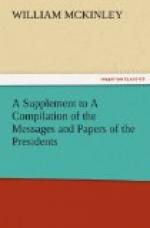From the earliest moment no opportunity was lost of assuring the people of the islands of our ardent desire for their welfare and of the intention of this Government to do everything possible to advance their interests. In my order of the 19th of May, 1898, the commander of the military expedition dispatched to the Philippines was instructed to declare that we came not to make war upon the people of that country, “nor upon any party or faction among them, but to protect them in their homes, in their employments, and in their personal and religious rights.” That there should be no doubt as to the paramount authority there, on the 17th of August it was directed that “there must be no joint occupation with the insurgents”; that the United States must preserve the peace and protect persons and property within the territory occupied by their military and naval forces; that the insurgents and all others must recognize the military occupation and authority of the United States. As early as December 4, before the cession, and in anticipation of that event, the commander in Manila was urged to restore peace and tranquillity and to undertake the establishment of a beneficent government, which should afford the fullest security for life and property.
On the 21st of December, after the treaty was signed, the commander of the forces of occupation was instructed “to announce and proclaim in the most public manner that we come, not as invaders and conquerors, but as friends to protect the natives in their homes, in their employments, and in their personal and religious rights.” On the same day, while ordering General Otis to see that the peace should be preserved in Iloilo, he was admonished that: “It is most important that there should be no conflict with the insurgents.” On the 1st day of January, 1899, urgent orders were reiterated that the kindly intentions of this Government should be in every possible way communicated to the insurgents.
On the 21st of January I announced my intention of dispatching to Manila a commission composed of three gentlemen of the highest character and distinction, thoroughly acquainted with the Orient, who, in association with Admiral Dewey and Major-General Otis, were instructed “to facilitate the most humane and effective extension of authority throughout the islands, and to secure with the least possible delay the benefits of a wise and generous protection of life and property to the inhabitants.” These gentlemen were Dr. Jacob Gould Schurman, president of Cornell University; the Hon. Charles Denby, for many years minister to China, and Prof. Dean C. Worcester, of the University of Michigan, who had made a most careful study of life in the Philippines. While the treaty of peace was under consideration in the Senate, these Commissioners set out on their mission of good will and liberation. Their character was a sufficient guaranty of the beneficent purpose with which they went, even if they had not borne the positive instructions of this Government, which made their errand pre-eminently one of peace and friendship.




